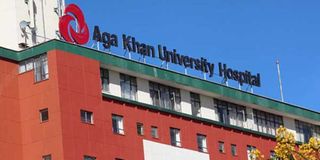Aga Khan University holds breast cancer symposium

The Aga Khan University Hospital in Nairobi. The hospital in conjunction with the Aga Khan University held a two-day breast cancer symposium on Friday, April 20, 2018. PHOTO | FILE | NATION MEDIA GROUP
What you need to know:
- The event is significant as it comes at a time when the Aga Khan University Hospital is increasing its investment in modern technology for cancer diagnosis and treatment.
The conference is the first of its kind in Kenya and we want to make it a recurring annual event that aims to address the challenges of oncology care and provide region specific solutions.
Kenya is currently ranked as one of the countries with the highest age specific rate of breast cancer in Africa.
The Aga Khan University in partnership with the Aga Khan University Hospital (AKUHN) on Friday kicked off a two-day breast cancer symposium.
The Ministry of Health, National Institutes of Health-Kenya, Memorial Sloan Kettering Cancer Centre, the Union for International Cancer Control, and MD Anderson Cancer Centre are the other partners in the meeting. Shawn Bolouki, the chief executive officer, AKUHN, said the event was significant as it comes at a time when the hospital is increasing its investment in modern technology for cancer diagnosis and treatment.
DIAGNOSIS
Dr Miriam Mutebi, lecturer and breast cancer surgeon at AKU and co-chair of the symposium, said the meeting offers global perspectives on best practices in the management of the disease.
“This partnership provides a platform for deliberations on the most recent updates in breast cancer diagnosis treatment,” Dr Shubra Ghosh of MD Anderson Cancer Centre said.
“We recently acquired an ultra-modern Positron Emission Tomography (PET)/CT scanner and Cyclotron. A first in East and Central Africa, we are confident that the PET/ CT and Cyclotron will revolutionise cancer diagnostics and follow up treatment in the region, and East Africans will not need to travel abroad for cancer treatment,” he said.
RESOURCES
Dr Mutebi said it will take into consideration resource-poor settings in Sub Saharan Africa. “This conference is the first of its kind in Kenya and we want to make it a recurring annual event that aims to address the challenges of oncology care and provide region specific solutions as well as draw upon the expertise and experience of international, regional and local faculty.”
“As a cancer patient, where you live in the world should never be the determinant of the quality of care that you receive. The underlying ethos, when we conceptualised this forum, is that low resource settings should not be equivalent to sub-optimal care. We envisage building a regional network that will allow us to constantly challenge ourselves as healthcare practitioners, policy makers, cancer advocates, and care givers, to innovate, iterate and come up with region specific, resource and culturally appropriate strategies to tackle cancer care. These strategies would incorporate internationally recommended best practices and would always have our patients, at the centre of our focus,” she concluded.
DELIBERATIONS
Dr Shubra Ghosh, project director for global programmes at MD Anderson Cancer Centre said in spite of the regional gains achieved over the past decade, there is still limited availability of breast conservation therapies, inadequate access to drugs, few oncology specialists and adherence to harmful socio-cultural beliefs and practices. “The partnership between AKU and the local, regional and international oncology centres provides the platform for deliberations on the most recent updates in breast cancer diagnosis treatment, and palliative care”
“In Kenya, statistics show that 70 to 80per cent of cancer cases are diagnosed at a late stage due to lack of awareness, inadequate diagnostic facilities, and increased cost of treatment compounded by the high poverty index. Late stage disease has poor outcomes and is more costly to manage. In order to change this, it is important for policy makers to be engaged and to hear from both our local and international experts. We are greatly encouraged to have the Ministry of health and National Institutes of Health Kenya, playing a key role, as we build these critical partnerships,” Dr Shahin Sayed, assistant professor of pathology at AKU and Chair of the symposium said.
IMPROVING
Kenya is currently ranked as one of the countries with the highest age specific rate of breast cancer in Africa, according to the 2012 GLOBOCAN report. Breast cancer ranks as the fifth cause of death from cancer overall and it is the most frequent cause of cancer death in women in less developed regions. This trend in Africa has been attributed to a change in the occurrence of established breast cancer risk factors that favours rising incidence. However, there is limited information about the challenges of cancer management and attempts at improving outcomes in Africa.




